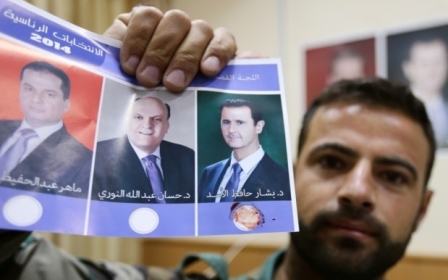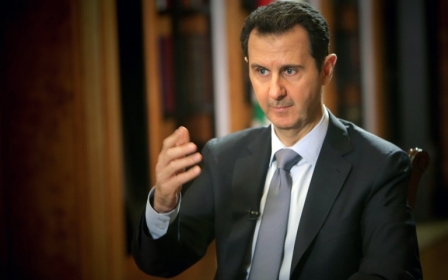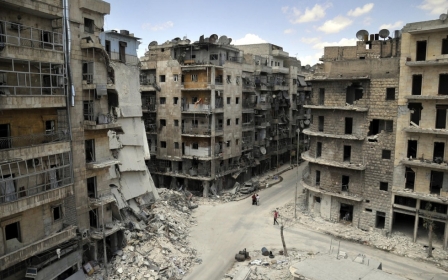Assad wins in Syrian election critics call 'great big zero', 'farce'

Bashar al-Assad has won the Syrian presidential election with 88.7 percent of the vote according to the speaker of parliament, with rebel groups and their international backers labelling the process a “farce”.
The other candidates – Hassan al-Nuri and Maher al-Hajjar – won 4.3 percent and 3.2 percent respectively, out of the 11.6 million people who voted giving a turnout of 73.42 percent.
“I congratulate Syria for choosing its chief, who will carry its people to the shores of security and stability,” said Mohammad al-Lahham, speaker of the parliament, when he announced the result.
Celebratory gunfire killed at least three people in the capital Damascus when it was confirmed Assad will serve a third seven-year term, the Syrian Observatory for Human Rights said.
Other street celebrations were reported throughout the country.
This was the first election under Assad in which other candidates were permitted to stand. He previously won 98 percent and 97.29 percent in the 2000 and 2007 referendums on whether his presidency should continue.
Voting this time only took place in the roughly 40 percent of Syria under the control of government forces, with state media lauding a high turnout. Pro-government newspaper Al-Watan said millions had voted, "defying terrorism and its mortars, rockets, car bombs and suicide attackers, to prove the legitimacy" of Assad.
Opposition figures have decried what they called “blood elections” and said people have voted out of fear not conviction. The Americans said it was a “disgrace” to hold an election while a brutal civil war, which has killed more than 162,000 people and driven millions from the home, rages on.
US Secretary of State John Kerry, who was in Beirut for an unexpected visit on Wednesday, described the vote as a “great big zero” and urged Assad’s allies Iran, Russia and Lebanon’s Hezbollah to end the war. Kerry announced a further $290 million in humanitarian aid for Syria in Beirut, saying “the conflict is still the same, the killing is the same”.
Despite the announcement of more aid, the US has come under increasing fire for failing to take further action over the conflict. Former US ambassador to Syria Robert Ford told CNN he retired because he could no longer defend US policy.
"We have been unable to address either the root causes of the conflict in terms of the fighting on the ground and the balance on the ground, and we have a growing extremism threat," Ford said, adding moderate rebels "need to get the tools they must have to change the balance on the ground, at least in some localities."
Analysts have said the elections have been designed as a show of strength by Assad and his supporters.
“Assad is hoping these elections will confirm in the minds of Syrians that he will prevail in this struggle and be their leader for a long time,” said Joshua Landis, director of the Centre for Middle East Studies at the University of Oklahoma. “The publication of photos with him casting his vote surrounded by large numbers of people are designed to show Syria and the world that the people love him and that he is a strong leader.”
“Assad isn’t going anywhere and the $5bn of funds to be spent on counter-terrorism announced by Obama is not enough to destroy the Syrian army and counter Iranian and Russian influence.”
Chris Doyle, Director of the Council for Arab-British Understanding (CAABU), said false hype was created by those who claimed that the chances of a political solution in Syria would be undermined if the election went forward.
"That is binding to the idea that this changes anything," he said. "[The election] is a demonstration of the regime's power, but nothing more. Not its legitimacy. It does not give it a mandate."
The election results, Doyle said, will likely give Assad the confidence to press forward on the battle field in Aleppo. Russia, Iran and China, he added, may take the opportunity to portray him as a democratically elected leader with "no possible question of him stepping down or even sharing power."
Others questioned the official turnout figures.
New MEE newsletter: Jerusalem Dispatch
Sign up to get the latest insights and analysis on Israel-Palestine, alongside Turkey Unpacked and other MEE newsletters
Middle East Eye delivers independent and unrivalled coverage and analysis of the Middle East, North Africa and beyond. To learn more about republishing this content and the associated fees, please fill out this form. More about MEE can be found here.




